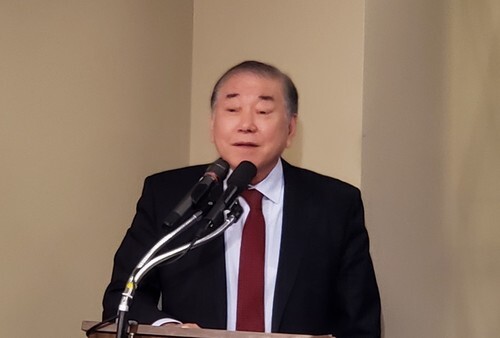hankyoreh
Links to other country sites 다른 나라 사이트 링크
Special presidential advisor says Trump will have to give “strong response” if N. Korea launches ICBM

Moon Chung-in, South Korea's special presidential advisor for unification, foreign affairs and national security, has predicted that if North Korea launches an intercontinental ballistic missile (ICBM) or a satellite sometime in February, the Trump administration will have no choice to give a “strong response” despite its current focus on Iran.
Speaking at a seminar on North Korea-US relations hosted by the think tank Center for the National Interest in Washington, DC, on Jan. 6, Moon said, “The Trump administration will view [an ICBM launch] as a calculated move by North Korea, and as it’s come under heavy political fire from the Democratic Party, it’s possible Trump will give a strong, punitive response, even if that means taking military action on two fronts, in Iran and North Korea.”
If the US, France, and the UK agree to Russia and China’s proposal to ease sanctions on North Korea under the condition of denuclearization, it could relieve the current deadlock in North Korea-US negotiations, Moon added. “It won’t be easy,” he said, “but if the proposal contains a way to gradually lift sanctions under the condition that North Korea denuclearizes, including the shutdown of its Yongbyon facilities, the situation could be reversed.” Moon predicted that if such a compromise could be reached, the South Korean government would also support it.
“The [US’] current strategy of denuclearization first and compensation later is not working,” Moon stressed. “North Korea needs to return to the negotiating table, and the US needs to show more flexibility.”
“South Korea’s fundamental stance is to go along with the US,” Moon continued. “However, if progress continues to stall, the domestic political environment worsens, and the situation on the Korean Peninsula and throughout Northeast Asia takes a turn for the worse, even President Moon Jae-in won’t be able to continue supporting the US. He will likely adjust his position.”
S. Korean Ambassador to US asks Trump to continue to show “leadership” on N. Korea issueMeanwhile, South Korean Ambassador to the US Lee Soo-hyuck presented his credentials to US President Donald Trump during a White House ceremony on the same day. During the ceremony’s commemorative photo shoot, Trump asked Lee about recent events concerning North Korea, including the Workers’ Party of Korea Central Committee’s plenary session. In his response, Lee asked Trump to continue demonstrating leadership toward permanent inter-Korean peace, to which Trump responded that he would, according to the South Korean Embassy in Washington.
Also, Blue House National Security Office Director Chung Eui-yong, US National Security Adviser Robert O'Brien, and Shigeru Kitamura, head of Japan's Cabinet Intelligence and Research Office, are expected to convene in Washington on Jan. 8 to hold trilateral security negotiations and discuss ways to resume North Korea-US negotiations.
By Hwang Joon-bum, Washington correspondent
Please direct comments or questions to [english@hani.co.kr]

Editorial・opinion
![[Editorial] Perilous stakes of Trump’s rhetoric around US troop pullout from Korea [Editorial] Perilous stakes of Trump’s rhetoric around US troop pullout from Korea](https://flexible.img.hani.co.kr/flexible/normal/500/300/imgdb/original/2024/0509/221715238827911.jpg) [Editorial] Perilous stakes of Trump’s rhetoric around US troop pullout from Korea
[Editorial] Perilous stakes of Trump’s rhetoric around US troop pullout from Korea![[Guest essay] Preventing Korean Peninsula from becoming front line of new cold war [Guest essay] Preventing Korean Peninsula from becoming front line of new cold war](https://flexible.img.hani.co.kr/flexible/normal/500/300/imgdb/original/2024/0507/7217150679227807.jpg) [Guest essay] Preventing Korean Peninsula from becoming front line of new cold war
[Guest essay] Preventing Korean Peninsula from becoming front line of new cold war- [Column] The state is back — but is it in business?
- [Column] Life on our Trisolaris
- [Editorial] Penalties for airing allegations against Korea’s first lady endanger free press
- [Editorial] Yoon must halt procurement of SM-3 interceptor missiles
- [Guest essay] Maybe Korea’s rapid population decline is an opportunity, not a crisis
- [Column] Can Yoon steer diplomacy with Russia, China back on track?
- [Column] Season 2 of special prosecutor probe may be coming to Korea soon
- [Column] Park Geun-hye déjà vu in Yoon Suk-yeol
Most viewed articles
- 1‘Free Palestine!’: Anti-war protest wave comes to Korean campuses
- 260% of young Koreans see no need to have kids after marriage
- 3Korean president’s jailed mother-in-law approved for parole
- 4In Yoon’s Korea, a government ‘of, by and for prosecutors,’ says civic group
- 5Nuclear South Korea? The hidden implication of hints at US troop withdrawal
- 6[Photo] ‘End the genocide in Gaza’: Students in Korea join global anti-war protest wave
- 7Behind-the-times gender change regulations leave trans Koreans in the lurch
- 8[Editorial] Perilous stakes of Trump’s rhetoric around US troop pullout from Korea
- 9Korea likely to shave off 1 trillion won from Indonesia’s KF-21 contribution price tag
- 10Yoon’s revival of civil affairs senior secretary criticized as shield against judicial scrutiny